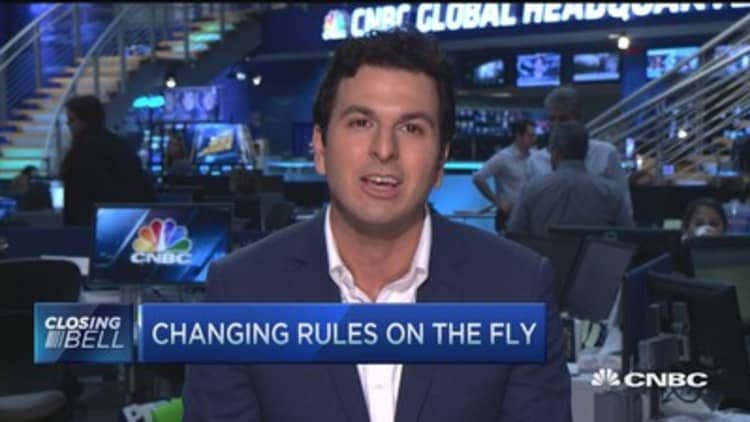
China's stock market rebounded slightly on Thursday, slowing a massive selloff that has erased trillions of yuan of value in recent weeks.
The crash and subsequent measures to slow the losses have emphasized how different the Chinese stock market—which was established in the early 1990s—is from its American counterpart.
1. Everyday Chinese citizens dominate the market
Unlike many of the world's stock markets, most trades on the Chinese stock market are made by individual retail investors, rather than institutional investors. About 85 percent of trades are retail, according to Reuters.
China's approximately 200 million retail investors trade more often than any other investors on Earth—81 percent said they trade at least once a month, compared with 53 percent in the U.S, according to a recent survey by State Street.
That's alarming considering that another survey found more than two-thirds of the most recent batch of new investors didn't even graduate from high school—and many seem to be investing with borrowed money based on faith in the central government.
More than 30 million new trading accounts were added in the first five months of 2015, according to data from the China Securities Depository and Clearing Corp. That's more than the population of Texas, and three times as much as were added in all of 2014.
Trade volumes have also reached new highs recently. As of May, the latest data available, those volumes were set to more than double last year's total and to set a record for the two exchanges.
"Remember during the dot-com boom when everyone from the taxi driver to your grandmother was investing and making money? People quitting their jobs to be day traders?" said an American working for an international bank in Shanghai. "That is exactly what it is like in China. I have staff that quit their jobs to do day trading."
All that enthusiastic day trading explains the recent stock market boom despite weak economic growth and the Chinese market's unique volatility. While institutional investors can probably be counted on to take a long view, the power of retail investors in China's market may not bode well for the government's attempts to halt the panic.
"This is exactly when any sane investor would pull out," said the banker.
2. China's IPOs can move the market
Freezing new initial public offerings on the and Shenzhen stock exchanges was once of the first of many efforts by the People's Bank of China—including lowering interest rates and bank reserve requirements, making brokerages buy stocks and allowing homes to be used as collateral—that have failed to stop the market's slide.
China has a long history of controlling IPO releases to stabilize its fledgling stock markets. This freeze is the ninth since 1990.
Chinese IPOs are often hugely underpriced. According to one study, they average first-day returns of 137 percent, compared with around 17 percent for U.S. IPOs and around 30 percent for other emerging economies. Earlier IPOs were underpriced by an average of 250 percent.
Those massive IPOs can lock up capital and draw money out of existing stocks. Freezing offerings is a step toward maintaining liquidity in a struggling market.
Some investors blame a wave of IPOs in June for causing the current crisis. Days after the market peaked, Shanghai saw its biggest IPO in five years at 30.1 billion yuan ($4.8 billion).
3. China's market is insulated from world markets
China's stock market tends not to correlate with other world markets, and less than 2 percent of Chinese shares are owned by foreigners. China restricts foreign capital in its mainland exchanges, and most international exposure to Chinese companies takes place through listings on the more open Hong Kong exchange.
"Foreigners have very limited access to the domestic market via programs such as QFII [qualified foreign institutional investor], but there are fees associated with this," said a Singapore-based hedge fund trader. "The easiest way for a foreigner to play China is via H-shares which trade in Hong Kong."
The few foreign buyers who were directly invested in the mainland market seemed to have seen the mania in the market long before it turned to panic.
While Chinese companies listed in Hong Kong have in the past few days, those stocks did not see the same huge gains and losses as on the Chinese market.
"At the moment, the A-share listings of these companies are trading at a substantial premium over the H-share listing—this clearly shows how much more domestic appetite there is for stocks relative to foreigners," said the trader.
The bigger risk for foreign investors is that the stock market crash in China will precipitate wider economic problems. China is still the world's largest economy, and the strife there could spill over into connected economies like the U.S.


